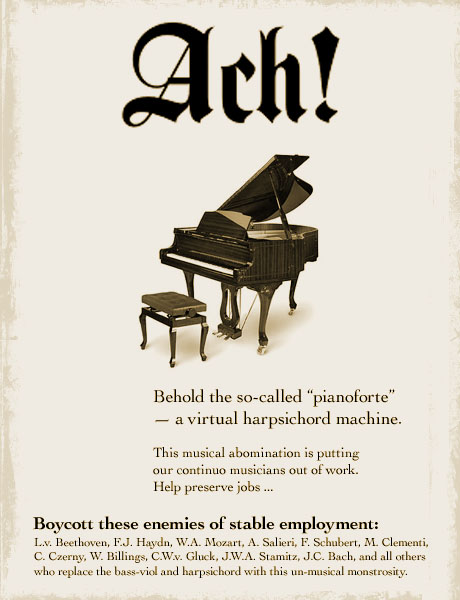The talk of "replacement" is a canard. You must realize that the rainbow of musical expression is ever-expanding. VSL and its instruments are merely a part of that expansion of the palette of musical instruments that has been going on at least since
that Neanderthal made his bone flute some 40,000 years ago.

I haven't replaced you, or anyone else. It's quite silly even to think in those terms. I'm a musician; you're a musician. You make money with your cello ... I with my Wii. The important thing is the musical experiences that result. The world of musical possibilities is so large and is expanding so rapidly that there is room for both of us.
Remember ...
The cello did not replace the viola da gamba.
The piano did not replace the harpsichord.
The radio did not replace the concert hall.
The electric guitar did not replace the acoustic guitar.
Casals recordings don't replace Yo-Yo Ma recordings.
And so, the digital orchestra does not replace anything either. It is simply adding. History and current practice proves this.
Let's not be concerned about the false distinction between "real" and "virtual," while at the same time accepting every single CD as "real" even though it is 100% digital. Musicians concerned about "replacement" rarely attack ballet companies for using pianos in their rehearsals - they did not attack Liszt for transcribing Beethoven's symphonies for piano - they also do not decry the giant music labels for selling recordings by long-dead performers. No, we only seem to hear from them when computers are involved ... and even then, only when classical music is involved.
So, if you construe the "replacement" idea more broadly and look at the aspects of musical production and consumption that really do have an affect on the livelihood of living musicians, it's clear that digital orchestras are so far at the bottom of the list of "threats" that it's not even funny. Von Karajan and Bernstein recordings far outsell all digital orchestra recordings, for example. Do you protest that listeners might prefer von Karajan and Bernstein CDs to those by Zinman and Dudamel? Are those CDs by dead performers taking money away from the living ones, - Of course they are NOT. And that is my point: The pie is expanding. We have Karajan AND Dudamel. It's not either/or. The more Karajan there is out there, the more people emerge who also will want to hear Dudamel. Hard to understand? Maybe. But that seems to be the way it works.
It helps to remember that musical experiences happen only in the minds of listeners. Those minds don't care one whit whether the experiences arise from a cello, the mind itself (e.g. in the case of a deaf Beethoven), a synthesizer, an orchestra, an iPod, a gamelan, or what. That musical experiences can arise from digital instruments is only going to be proven over and over again. Fighting it and denying it is not going to change that. It's time to realize that the validity or value of musical experiences is not and never has been tied to the means of sonic production. Once you understand that, and once you understand the seemingly infinite possibilities for the expansion of musical expression, you can see developments like VSL in the proper historical and musical context: as positive enhancements for human creativity and for access to that creativity. The pie is expanding, and that's a good thing.
- Paul

